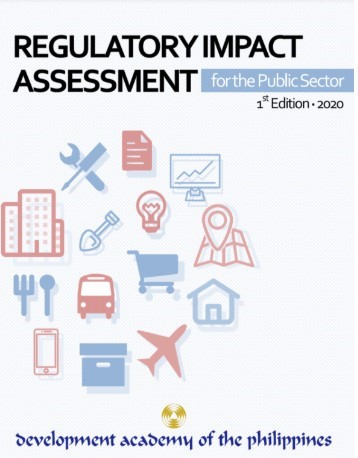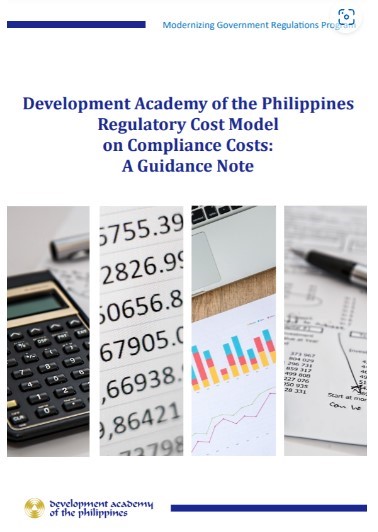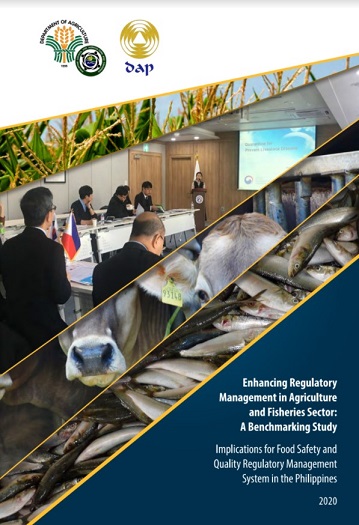Regulatory processes set frameworks and boundaries in which individuals, firms, and organizations can and should act within.
As the national productivity organization of the Philippines, the Development Academy of the Philippines (DAP) believes in the importance of the government playing an active role in the enhancement of productivity and establishment of a regulatory environment that will allow businesses to thrive while consequently ensuring the protection of public interest.
DAP contributes to the smarter public sector initiative of the Philippine Development Plan 2017-2022 through its Center for Governance (CFG) and Productivity and Development Center (PDC). The Academy serves as the policy think-tank and capacity-building arm to regulators in the government sector to uplift and sustain their quality and efficiency standards to be at par with the international regulatory standards.
Making regulations more relevant and coherent
The DAP’s Modernizing Government Regulations (MGR) Program is a regulatory reform initiative that aims to make broad-based improvements in national productivity and competitiveness by examining regulations and identifying possible regulatory governance reforms. Specifically, the MGR Program aims to contribute to the national government’s efforts to improve the ease of doing business in the country by developing mechanisms that would make regulations more relevant and coherent, and identifying specific measures to reduce unnecessary regulatory burden on specific industries. Once achieved, regulatory quality and coherence will be a stimulating factor in improving the overall business and investment climate in the country.
To help the Philippine government in its regulatory improvement initiatives, the MGR Programs developed tools and systems for the use of regulatory agencies and local governments. The Program developed the draft Regulatory Management System (RMS), which is a standard guideline for developing systems and tools for regulatory improvement.
For its regulatory review studies, in consultation with the National Economic and Development Authority (NEDA), the MGR Program focuses on regulations covering government-to-citizen, government-to-business and government-to-government transactions that affect the productivity of sectors/industries with the end-goal of streamlining unnecessary rules and reducing compliance costs borne by the government, from administering and enforcing regulations, as well as the transacting public.
The MGR Program’s capacity-development component focuses on capacitating regulators on the adoption of Good Regulatory Practices such as the conduct of Regulatory Impact Assessment (RIA), on how to utilize RIA as a tool for evaluating the costs and benefits of proposed and existing regulations. With clear information of the benefits of regulation, RIA also encourages compliance by strengthening the legitimacy of regulatory proposals thereby improving the effect of regulation and ease the cost of enforcement for the government and compliance for the businesses.
The MGR Program has also released regulatory reform publications as part of its initiatives to increase awareness and contribute to the adoption of good regulatory practices (GRPs).

DAP Guidebook on Regulatory Impact Assessment for the Public Sector
The Regulatory Impact Assessment (RIA) for the Public Sector 1st Edition was primarily developed for the use of regulation authorities tasked to create, develop, and manage regulations. RIA ensures the quality of regulatory proposals by critically measuring their positive and negative effects through a rigorous, well-defined, and evidence-based analysis.
DAP Guide on Stakeholder Consultation
Effective stakeholder consultation is fundamental in removing obstacles to improving regulation, such as establishing Regulatory Management Systems (RMS) and conducting RIA. Gaining a wider perspective can lead to better solutions and pathways to regulatory reform and development.

In various endeavors towards progress, stakeholder consultation promotes good governance, transparency, citizenship, and accountability. The publication of this guidebook seeks to enhance current government efforts in engaging its stakeholders.
DAP Guidance Note on Regulatory Cost Model on Compliance Costs
The estimation of regulatory compliance costs is a significant component of RIA as it provides key inputs in assessing regulatory options. Thus, as part of its MGR Program, the DAP initiated the development of the Regulatory Cost Model (RCM). The model facilitates a systematic approach in estimating regulatory costs of compliance and helps Philippine regulatory agencies be more informed in their formulation of regulations.
As the Philippine government endeavors towards the streamlining of its processes, the publication of this guidance note seeks to enhance current efforts in formulating simpler, smarter, and better regulations that ultimately benefit the economy.

DAP Benchmarking Study on Regulatory Management in Agri-Fisheries Sector
Food safety is a primary concern of every economy, the Philippines included. Food safety, together with consumer welfare and protection, are the primary bases for the regulatory processes imposed at each stage of the business development cycle for agri-food enterprises. However, no matter how good the intentions may be, how these regulatory processes are implemented and enforced may lead to unintended outcomes, defeating the very purpose of their formulation.
Performance assessment of the Philippines’ food systems regulation through participatory action research and benchmarking with more advanced food systems regulatory regimes yielded valuable recommendations to improve the overall regulatory management system in the agriculture and fisheries sector.
To get a free copy of these regulatory reform publications, visit https://mgr.dap.edu.ph/download/.
References
Development Academy of the Philippines (2018). Consumer Goods Regulatory Review. Modernizing Government Regulations Program Regulatory Review.
Food and Agriculture Organization of the United Nations. (2018). Ensuring the safety of imported food.http://www.fao.org/3/ca0286en/CA0286EN.pdf
Manalili, N. M., Ramos III F. A., Saliendres, M. D., Alvarez, A. D. (2020). Enhancing Regulatory
Management in the Agriculture and Fisheries Sector: A Benchmarking Study (Implications for Food Safety and Quality Regulatory Management System in the Philippines). Development Academy of the Philippines, PRP Printing.
Morales, R. (2013). Philippines. In Banking regulation 2013 (pp. 135-139). Law Business Research.
DAP Modernizing Government Regulations Program releases regulatory reform publications | PDC http://pdc.dap.edu.ph/index.php/dap-modernizing-government-regulations-program-releases-regulatory-reform-publications/
